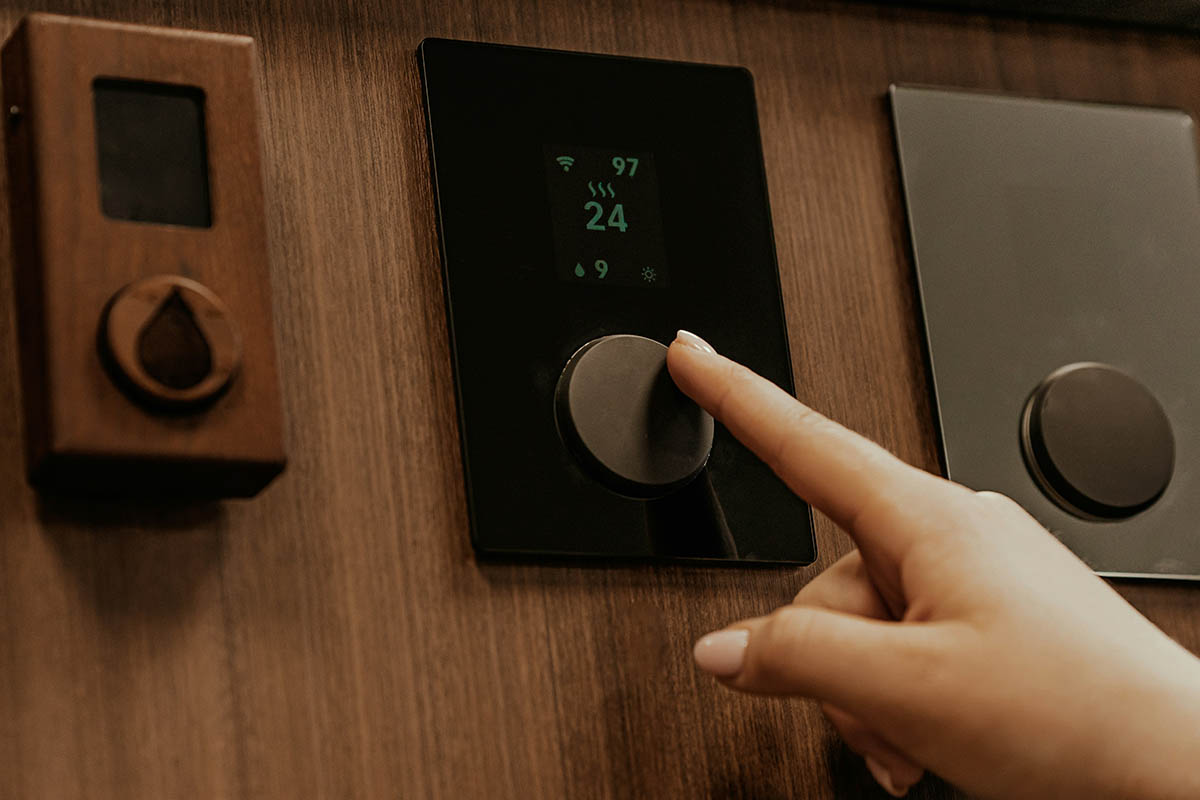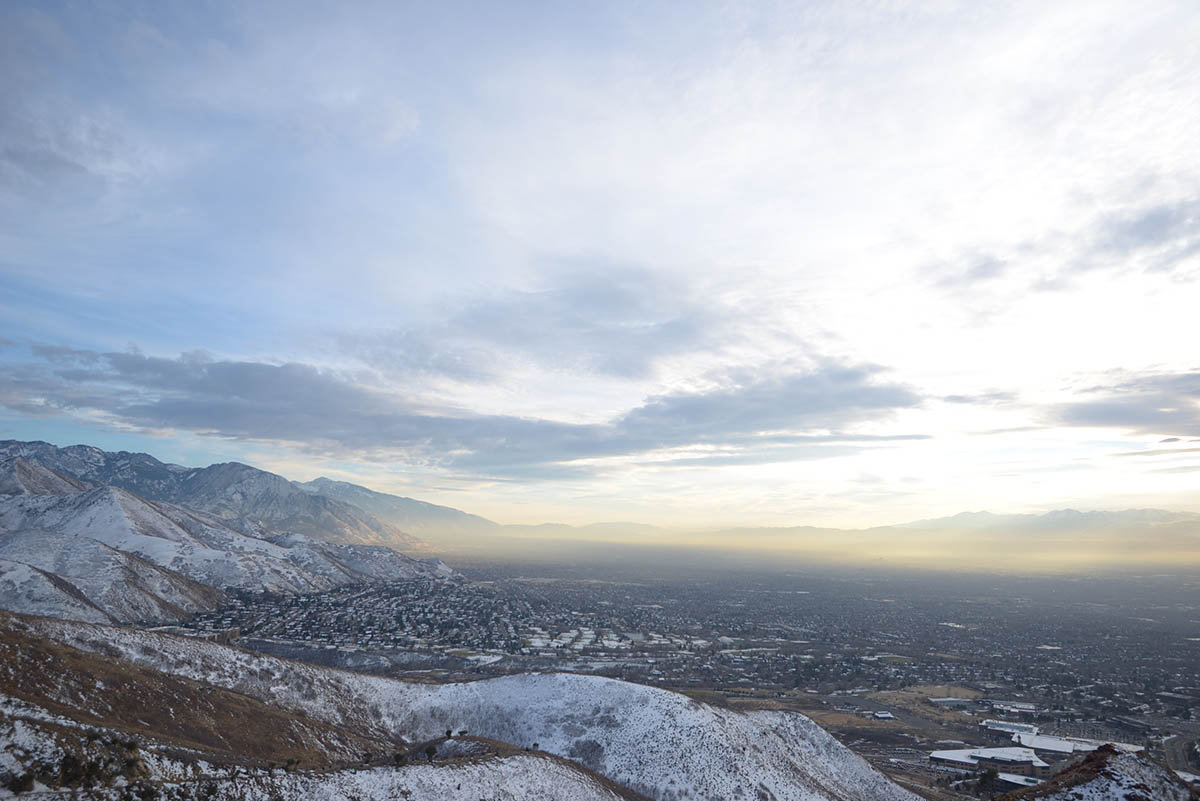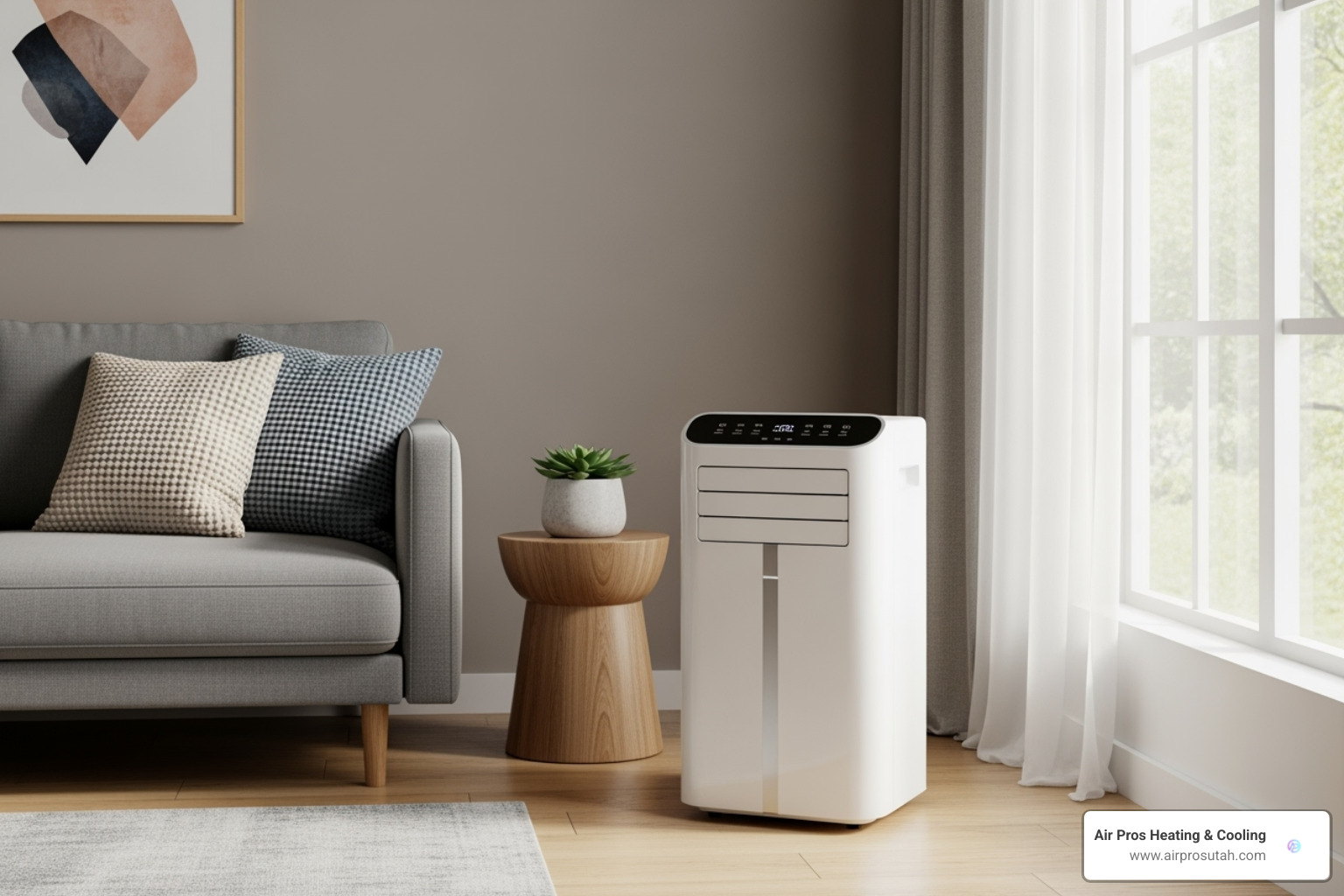
No Vent, No Sweat: Ventless Air Conditioner Buying Guide
Why Ventless Air Conditioners Are Popular for Hard-to-Cool Spaces
A ventless air conditioner offers cooling without requiring window vents or ductwork, making them ideal for apartments, offices, and rooms where traditional AC installation isn't possible. Here's what you need to know:
Quick Facts About Ventless Air Conditioners:
- What they are: Most are evaporative coolers that use water evaporation to cool air
- Best climate: Hot, dry environments (humidity below 60%)
- Energy use: 75% less electricity than traditional AC units
- Coverage: Typically cool 26-1,500 sq ft depending on model
- Cost: Range from $110-$420 for portable evaporative coolers
The challenge is that most products marketed as "ventless air conditioners" are actually evaporative coolers - they cool through water evaporation rather than true refrigeration. This means they work great in dry climates like Utah but struggle in humid conditions where they can actually make rooms feel more uncomfortable.
As Alex Wiltz, founder of Air Pros Utah Heating & Cooling, I've helped countless homeowners find the right cooling solutions for their unique situations. Through years of HVAC experience, I've learned that understanding the difference between true air conditioning and evaporative cooling is crucial for making the right choice for your home's comfort needs.
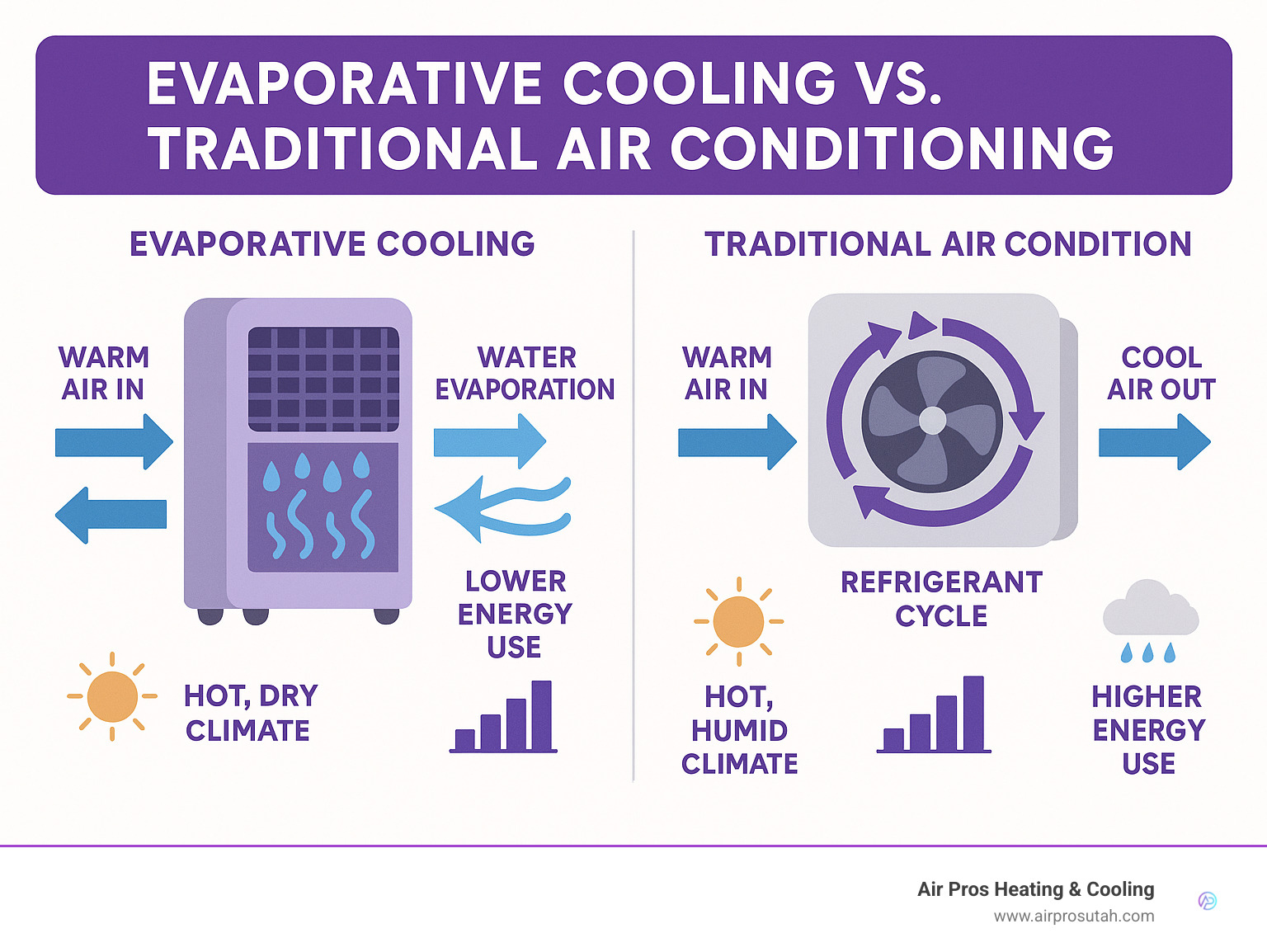
Ventless air conditioner word list:
What Are Ventless Air Conditioners and How Do They Work?
Picture stepping out of a swimming pool on a breezy day – that refreshing coolness you feel is evaporative cooling in action. That's exactly how a ventless air conditioner works, though most of these units are actually evaporative coolers (affectionately known as "swamp coolers" here in Utah).
The process is beautifully simple. These devices pull warm air from your room through water-saturated cooling pads. As water evaporates from these pads, it naturally absorbs heat from the air through heat transfer. A fan mechanism then circulates this cooler, slightly more humid air back into your space.
But here's the key: these units need dry air to work their magic. When humidity levels are high, the air is already packed with moisture, making it nearly impossible for more water to evaporate. This is why evaporative coolers absolutely shine in hot, low-humidity environments like our SLC Valley.
These coolers excel at spot cooling – creating a comfortable breeze in your immediate area rather than changing the temperature of an entire large room. They're perfect for directing cool air exactly where you need it most, and as a bonus, they add just enough moisture to combat our notoriously dry Utah air.
Some people use water and ice packs to boost the cooling power, though this requires more frequent maintenance and refills.
The Truth About "Ventless" Cooling
Let's clear up a big misconception here. The term "ventless air conditioner" is actually misleading for most of these units. When you think "air conditioner," you probably imagine a machine that removes heat and humidity from your space using a compressor and refrigerant – and you'd be right about traditional air conditioning.
Evaporative coolers vs. true air conditioners is an important distinction. Evaporative coolers don't have compressors or use refrigerant at all. They don't generate hot air that needs to be expelled, so they don't need vents. Instead, they work by adding moisture to cool the air.
How traditional portable ACs vent heat is completely different. These units must have an exhaust hose running to a window because they generate hot air during the cooling process. Without proper venting, they'd just heat up your room. So when you see a portable unit advertised as truly "ventless," it's almost certainly an evaporative cooler, not a traditional air conditioner.
The Superior Alternative: Ductless Mini-Splits
If you want true air conditioning without the hassle of window units or extensive ductwork, ductless mini-splits are your best bet. These systems provide genuine refrigerated cooling that works in any climate, humid or dry.
Instead of needing no window vents like evaporative coolers or bulky window installations like portable ACs, ductless systems only require a small wall opening (about 3 inches) to connect the indoor and outdoor units. As we explain in detail about How Do Ductless Mini Split Systems Work, this minimal installation preserves your home's appearance while delivering powerful cooling.
The real game-changer is zoned cooling. You can install multiple indoor units, each controlling temperature independently in different rooms. Keep your bedroom perfectly cool at night without wasting energy on empty spaces. It's a permanent solution that delivers consistent comfort regardless of outdoor humidity levels – something we specialize in here at Air Pros Heating & Cooling.
Pros and Cons of Ventless Cooling Solutions
Choosing the right cooling solution for your home means understanding what you're getting into. Let's take an honest look at how evaporative coolers (the most common ventless air conditioner) stack up against ductless mini-splits, so you can make the best decision for your comfort and budget.
| Feature | Evaporative Coolers (Ventless) | Ductless Mini-Splits (True AC) |
|---|---|---|
| Cost | Lower upfront cost ($110-$420) | Higher upfront cost (but energy savings over time) |
| Effectiveness | Best in hot, dry climates; adds humidity; spot cooling | Excellent in all climates; removes humidity; whole-room cooling |
| Portability | Highly portable; no installation needed | Fixed installation; allows for zoned cooling |
| Climate Suitability | Hot and dry (humidity < 60%) | All climates (hot, humid, dry) |
| Energy Use | Very low (up to 75% less electricity than traditional AC) | Very energy-efficient; zoned control saves energy |
| Maintenance | Regular water refills, tank cleaning, pad/filter replacement | Professional tune-ups, filter cleaning |
| Humidity Impact | Increases indoor humidity | Decreases indoor humidity |
The reality is that both solutions have their sweet spots. In our dry Utah climate, evaporative coolers can be fantastic budget-friendly options for the right situations. But when you need reliable, powerful cooling regardless of weather conditions, ductless mini-splits are the clear winner.
Advantages of Evaporative Coolers
When conditions are right, evaporative coolers really shine as a ventless air conditioner option. Here's why they've earned their place in many Utah homes.
Energy efficiency is their biggest selling point. These units sip electricity like a hummingbird sips nectar, using up to 75% less power than traditional air conditioners. Since they only need to run a fan and a small water pump, your electric bill stays refreshingly low even during those scorching summer months.
Their eco-friendly nature goes hand-in-hand with that efficiency. No refrigerants means no worries about harmful chemicals, and that lower energy consumption translates directly to a smaller carbon footprint. It's cooling you can feel good about.
Portability makes these units incredibly versatile. Need cool air in your home office during the day and your bedroom at night? Just roll it wherever comfort is needed. No installation headaches, no permanent commitments.
The lower upfront cost makes them accessible to almost any budget. At $110 to $420, they're a fraction of what you'd spend on central air or even a quality portable AC unit. For many families, this affordability opens the door to relief from summer heat that might otherwise be out of reach.
In our bone-dry Utah climate, adding humidity can actually be a blessing. These coolers put moisture back into parched air, which can soothe dry skin, help you breathe easier, and even keep your houseplants happier. It's like getting a gentle humidifier as a bonus feature.
Disadvantages and Limitations
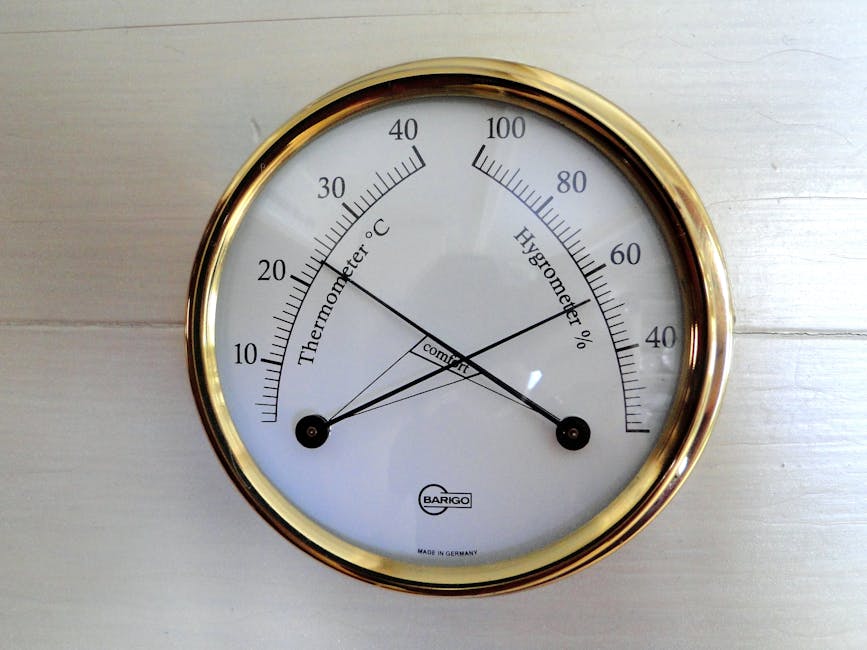
Now for the reality check. Evaporative coolers have some serious limitations that you need to understand before making your decision.
High humidity is their kryptonite. When the air is already loaded with moisture, these units become about as effective as a chocolate teapot. They can't evaporate water efficiently in humid conditions, and worse, they'll pump even more moisture into your already muggy space. This makes humid rooms feel downright swampy.
That added moisture becomes a real problem in the wrong climate. As the EPA warns, added moisture build-up can contribute to water damage, mold growth, and even breathing problems. Nobody wants their cooling solution to become a health hazard.
Mold and bacteria growth is a constant concern with any device that uses standing water. Those cooling pads and water reservoirs create perfect breeding grounds for nasty microorganisms if you don't stay on top of cleaning. Neglect maintenance, and you might end up blowing contaminated air around your home.
Constant water refills can become tedious, especially during peak summer use. Depending on your unit's tank size and how often you run it, you might find yourself playing water boy several times a day. Some people love this hands-on approach, others find it annoying.
The cooling power limitation is real. While they can drop temperatures by 5-15 degrees in perfect conditions, that's nowhere near the precise, powerful cooling of true air conditioning. They're great for making you feel more comfortable, but they won't transform a hot room into an arctic oasis.
These limitations aren't deal-breakers for everyone, but they're important to understand. In the right climate and with proper expectations, evaporative coolers can be wonderful. But when you need guaranteed comfort regardless of conditions, that's where ductless mini-splits really prove their worth.
How to Choose the Right Ventless Air Conditioner
Selecting the perfect ventless air conditioner for your space doesn't have to be overwhelming. Think of it like choosing the right pair of shoes – you need to consider where you'll be "walking" and what conditions you'll face!
Room size is your starting point. These evaporative coolers work best in small to medium-sized spaces, typically ranging from personal cooling areas up to about 1,500 square feet, depending on the model. A unit that's too small for your space will work overtime without delivering the comfort you're after, while an oversized unit might be overkill for a cozy bedroom.
But here's the most crucial factor: your climate. We can't stress this enough – evaporative coolers are absolute champions in hot, dry environments but struggle mightily when humidity creeps above 60%. If you're in a humid area, these units might actually make you feel stickier rather than cooler. It's like trying to dry off with a wet towel!
When evaluating cooling capacity, consider how you'll use the unit. Will you be sitting directly in front of it for personal cooling, or do you need it to improve the overall comfort of an entire room? Water tank size matters too – larger tanks mean fewer interruptions for refills, which is especially important if you plan to run the unit for extended periods.
Don't overlook portability features like smooth-rolling wheels and convenient handles if you plan to move your cooler between rooms. And trust us, noise level can make or break your experience, especially if you're hoping for peaceful sleep or focused work time.
Understanding Cooling Power: CFM vs. BTU
Shopping for a ventless air conditioner means learning a new measurement language. Instead of BTU (British Thermal Units) that traditional air conditioners use, evaporative coolers are rated by CFM, or cubic feet per minute (CFM). This tells you how much air the unit can move through your space.
Think of it this way: traditional ACs are measured by how much heat they can remove (that's where BTU, which stands for British Thermal Units comes in), while evaporative coolers are all about airflow and the cooling effect of moving moist air.
To calculate your CFM needs, multiply your room's length, width, and height to get cubic footage. For personal cooling right next to the unit, a lower CFM works fine. But if you want to improve comfort throughout a larger room, you'll need higher CFM to create enough air movement for the evaporative cooling effect to reach you.
Key Features and Maintenance Needs
Modern evaporative coolers come packed with thoughtful features that make daily use a breeze. Remote controls let you adjust settings from across the room – no more getting up from your comfortable spot! Timers are fantastic for programming the unit to start cooling before you arrive home or to shut off after you fall asleep. Many units also offer sleep modes that run more quietly during nighttime hours.
Filter cleaning is surprisingly simple and keeps your unit running at peak performance. Most models have washable filters that you can rinse clean under running water. It's one of those satisfying maintenance tasks that takes just a few minutes but makes a real difference in air quality and cooling effectiveness.
Water tank maintenance deserves special attention since it's the heart of your cooling system. Regular cleaning prevents algae, mold, and bacteria from setting up shop in your unit. Empty and wipe down the tank weekly, and always drain it completely when the unit won't be used for extended periods. Some smart models even have a fan-only mode that helps dry out the cooling pads after use, naturally preventing mold growth.
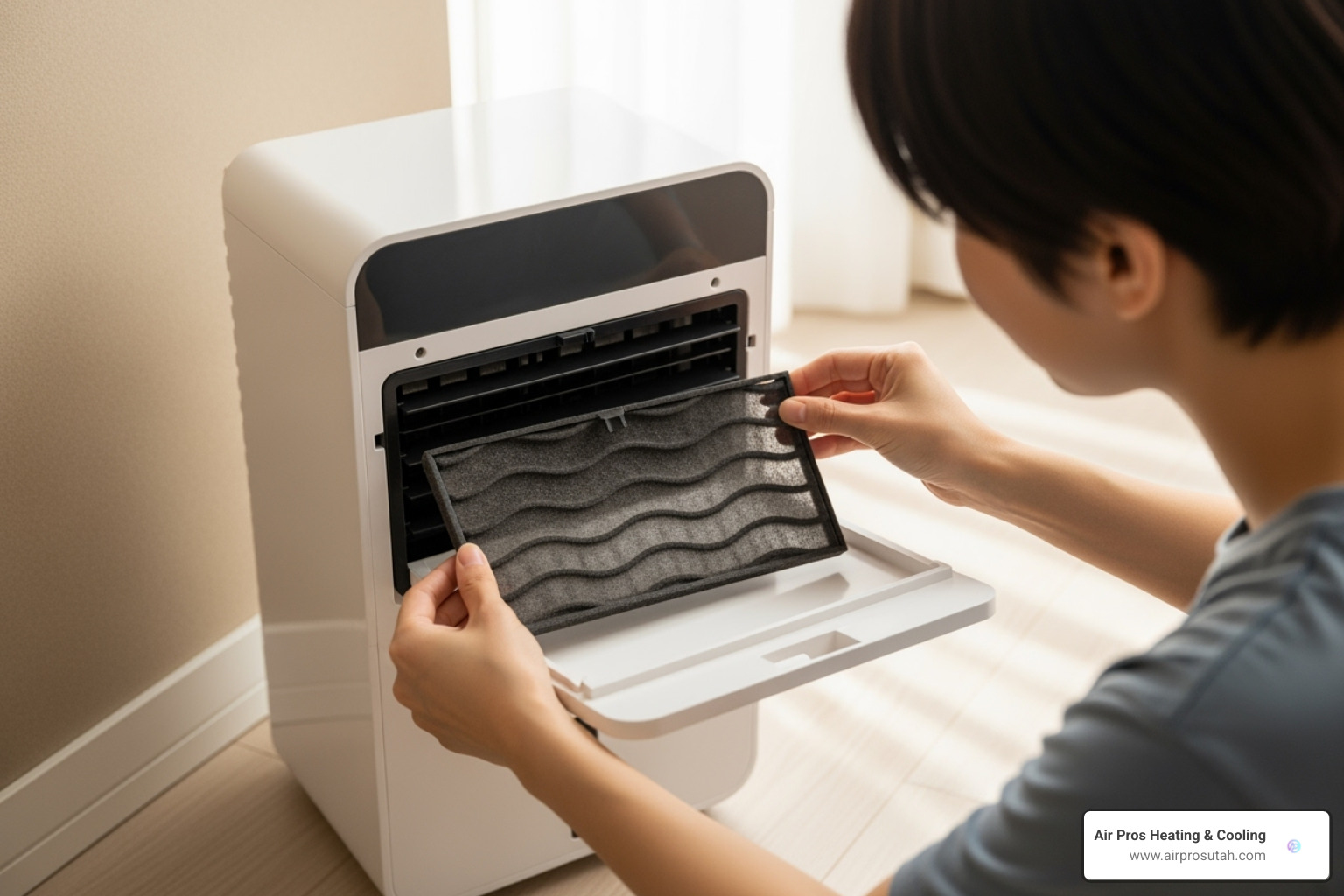
If you find yourself wanting more consistent, powerful cooling that works in any climate, it might be time to consider a permanent solution like ductless mini-splits. Our team at Air Pros Heating & Cooling specializes in these systems and can help you explore options that provide true air conditioning without the hassle of window units or extensive ductwork. We're also here if you need guidance on Ductless Mini Split Repair or any other HVAC concerns.
Frequently Asked Questions About Ventless Cooling
We get a lot of great questions about ventless air conditioner units from homeowners throughout the SLC Valley. After years of helping folks find the right cooling solutions, I've noticed the same questions come up again and again. Let me share the answers that matter most to you.
Can a ventless air conditioner cool a room without a window?
Absolutely! This is exactly what evaporative coolers (the most common type of ventless air conditioner) are designed for. They're perfect for those tricky spaces where traditional window units just won't work - think interior offices, basement rooms, or apartments where you can't modify the windows.
The magic happens without any external venting or window access, which is why they're so popular. However, here's the important part: their effectiveness depends heavily on your climate's humidity levels. In our beautiful, dry Utah climate, they work wonderfully because the evaporation process thrives in low-humidity conditions.
But here's something to keep in mind - even though these units don't need windows, they do benefit from some air circulation. In a completely sealed room, especially if there's any humidity, the air can quickly become saturated with moisture. This makes the cooler work less effectively and can leave you feeling muggy instead of refreshed. Simply opening an interior door or having some basic ventilation helps tremendously.
Are ventless air conditioners energy-efficient?
This is one of my favorite questions because the answer is such good news for your wallet! Ventless air conditioners are incredibly energy-efficient, consuming up to 75% less electricity than traditional compressor-based air conditioners. That's a significant difference that shows up on your monthly energy bills.
The reason they're so efficient is beautifully simple. While traditional air conditioners need powerful compressors running constantly (which are major energy hogs), evaporative coolers only need to power a fan and a small water pump. It's like comparing a motorcycle to a semi-truck in terms of fuel consumption.
This energy efficiency makes them particularly attractive for anyone looking to stay comfortable without breaking the bank on electricity costs. If you're interested in learning more about energy-efficient cooling solutions for our Utah climate, you might find our insights on Energy Efficient Mini Split systems helpful as well.
What maintenance is required for a ventless air conditioner?
Maintaining your ventless air conditioner is refreshingly straightforward, but staying on top of it is crucial for both performance and health. Think of it like caring for a houseplant - a little regular attention keeps everything running smoothly.
Water tank maintenance is your most frequent task. You'll need to refill the water reservoir regularly since the unit constantly uses water for evaporation. How often depends on your tank size and usage, but most people find themselves refilling every day or two during heavy use.
Cleaning the water tank is equally important and something we can't stress enough. Every few weeks, give that tank a thorough cleaning to prevent mildew, algae, and bacteria from setting up shop. Always drain any standing water when you're not using the unit for extended periods - trust me, your future self will thank you for this habit.
Filter and cooling pad care keeps your air fresh and your unit efficient. The cooling pads and air filters collect dust, minerals from the water, and potentially mold over time. Most filters are washable, and you can clean or replace the pads according to your manufacturer's instructions. It's usually a quick, easy job that makes a big difference.
Here's a pro tip from our years in the HVAC business: when you're done using your unit for the day, run it on "fan only" mode for about 30 minutes. This dries out the pads and helps prevent mold growth - a simple step that extends your unit's life and keeps your air quality high.
Following these straightforward maintenance steps ensures your evaporative cooler continues providing fresh, cool air season after season. And remember, if you ever need guidance on any aspect of home cooling, our team at Air Pros is always here to help you stay comfortable year-round.
Your Ultimate Solution for No-Vent Cooling
So, we've explored ventless air conditioner units – primarily evaporative coolers – and finded they're wonderful for their energy efficiency, portability, and eco-friendliness. They truly shine in hot, dry climates like ours here in Utah, providing that welcome breeze and adding just the right touch of humidity to our arid environment.
But let's be honest about their limitations. These units struggle when humidity creeps up, need regular water refills and diligent cleaning to prevent mold, and simply can't deliver the powerful, dehumidifying cooling of a true air conditioner. If you're dealing with any humidity in your climate, or if you need more robust, consistent cooling without the hassle of window vents, there's definitely a better approach.
That's where we at Air Pros Heating & Cooling come in. We specialize in providing custom, high-quality HVAC solutions that bring year-round comfort to homes and businesses across the SLC Valley. From Salt Lake City to Sandy, West Jordan and beyond, we're committed to clear communication, fair pricing, and building relationships that last.
For powerful, efficient cooling in any climate without a window vent, our top recommendation is a ductless mini-split system. These aren't just fans or evaporative coolers – they're true air conditioning systems that offer incredible benefits. You get zoned cooling for personalized comfort in every room, exceptional energy efficiency, and whisper-quiet operation, all without extensive ductwork or unsightly window units. They only require a small, discreet connection to the outdoors, making them a sleek and effective solution for any space.
If you're ready to experience the ultimate in no-vent cooling and true air conditioning comfort, we invite you to explore our specialized HVAC Services: Ductless Mini Split solutions. Let us help you find the perfect system to keep your home cool and comfortable, no matter how hot it gets outside. With Air Pros Heating & Cooling, you'll never have to sweat the small stuff – or the big stuff!


